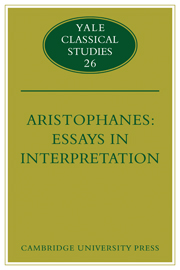War and peace in the comedy of Aristophanes
Published online by Cambridge University Press: 10 January 2011
Summary
The successful production in recent years of the so-called peace plays of Aristophanes in a number of German theaters provides a challenge for classical scholars to renew analysis of these comedies. Peter Hacks' adaptation of Peace, which opened in Berlin, has been a popular success in many theaters. Acharnians, in the adapted translation of Wolfgang Schadewaldt, was accepted much less readily, but Lysistrata, for many years the most frequently performed comedy of Aristophanes, has since 1972 had outstanding success in a new translation by Schadewaldt. In this essay I shall attempt to answer the challenge posed by these theatrical successes primarily by examining the differences between the three comedies in their treatment of war and peace. In addition, I hope to demonstrate an aspect of Lysistrata that has until now received scant notice.
Accordingly, let us turn directly to the question of exactly how Aristophanes represents war and peace in his peace-plays and how he brings the concept of peace to dramatic life on the stage; for while he manages to accomplish peace in all three comedies, the nature and presentation of peace differ greatly from play to play.
The action of Acharnians, produced in 425, the sixth year of the Peloponnesian War, is highly political from the very opening scene. The farmer, Dicaeopolis, is shocked that all attempts to deliberate about peace in the Assembly have failed.
- Type
- Chapter
- Information
- Aristophanes: Essays in Interpretation , pp. 219 - 237Publisher: Cambridge University PressPrint publication year: 1981
- 2
- Cited by



